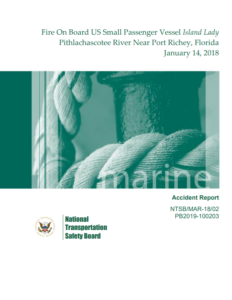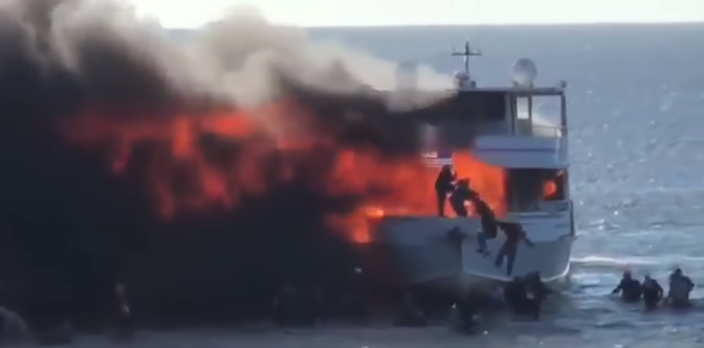The incident
About 1600 on the afternoon of 14 January 2018, a fire broke out in an unmanned space on the small passenger vessel Island Lady near Port Richey, Florida, during a scheduled transit to a casino boat located about 9 miles offshore in the Gulf of Mexico. 53 people were on board the Island Lady. After receiving a high-temperature alarm on the port engine, the captain turned the Island Lady around to return to the dock. During the return trip, smoke began filling the lazarette, main deck, and engine room. The captain deliberately beached the vessel in shallow water near shore to evacuate the passengers. All crewmembers, employees, and passengers evacuated the vessel by entering the water and wading/crawling ashore. Fifteen people were injured and transported to local hospitals; one passenger died in the hospital several hours after the fire. The Island Lady, valued at $450,000, was declared a constructive total loss.
Probable cause
NTSB determines that the probable cause of the fire onboard Island Lady was Tropical Breeze Casino Cruz’s ineffective preventive maintenance program and insufficient guidance regarding the response to engine high-temperature conditions, which resulted in the captain’s continued operation of an engine that was overheating due to a cooling water pump failure, leading to ignition of the exhaust tubing and surrounding structure. Contributing to the spread of the fire was the lack of fire detection in the vessel’s lazarette, which was not required by regulations and which allowed the fire to take hold unbeknownst to the crew.
The NTSB identified the following safety issues:
- Lack of company guidance regarding engine high-temperature alarms: After the captain received a high-temperature alarm for the port engine’s jacket-water system, he did not shut down the engine but instead left it idling. Doing so allowed the overheating engine to continue to generate excessive heat, which in turn affected the exhaust tubes and ignited their surrounding structures. Tropical Breeze Casino Cruz did not provide specific guidance to its vessel captains about how to respond to high-temperature alarms.
- Lack of fire detection in unmanned spaces with exhaust tubing: Although federal regulations require small passenger vessels to have fire detection and suppression systems in spaces containing propulsion machinery (such as engine rooms), the regulations do not require such systems in unmanned spaces with engine exhaust tubing. The fire on board the Island Lady most likely started in the lazarette―an unmanned space aft of the engine room―through which the exhaust tubes led toward the vessel’s stern. Because there was no fire in the engine room initially, activating the vessel’s fixed fire suppression system for that space would have served no purpose; further, activation would have caused the vessel to needlessly lose all available propulsion during the emergency.
- Insufficient preventive maintenance: Although Tropical Breeze Casino Cruz stated that it implemented a preventive maintenance program after a previous fire on board a company vessel (the Express Shuttle II) in response to an NTSB safety recommendation, the quality of the program was insufficient. The US Coast Guard does not require small passenger vessels to have preventive maintenance programs and, importantly, even when such programs are voluntarily in place (such as in this case), the Coast Guard provides no enforcement oversight.
- Insufficient crew training and documentation: The investigation revealed that the Island Lady crewmembers lacked sufficient understanding of firefighting principles and that their training drills were infrequent or not completed. In addition, records pertaining to crew training drills and daily maintenance checklists were kept only on board the vessel and were lost in the fire; no duplicate records were kept ashore.
- Inappropriate material and design of fuel tank level-indicator system: Counter to Title 46 Code of Federal Regulations 182.440 (a)(7), the Island Lady’s fuel tanks were equipped with plastic hoses used as fuel level indicators; further, the system did not have automatic shutoff valves. As a result, during the fire, the plastic material melted and the release of diesel fuel exacerbated the fire.
Recommendations
As a result of this investigation, the National Transportation Safety Board advised:
- Develop and apply an oversight system to ensure that your maintenance program complies with the manufacturer’s recommended preventive maintenance program for the engines and associated machinery and systems onboard vessels.
- Revise marine firefighting and job training programs, including documenting both on board and ashore that all crewmembers are qualified and can continually demonstrate proficiency in their duties, such as firefighting techniques and other emergency situations.
- Require fire detection systems in unmanned spaces with machinery or other potential heat sources on board small passenger vessels.
- Issue a Marine Safety Information Bulletin that addresses the need to use only approved material and components in fuel tank level-indicator systems.
Explore more herebelow:


































































